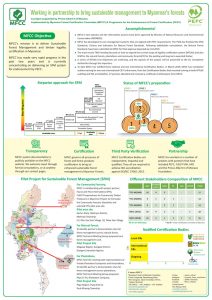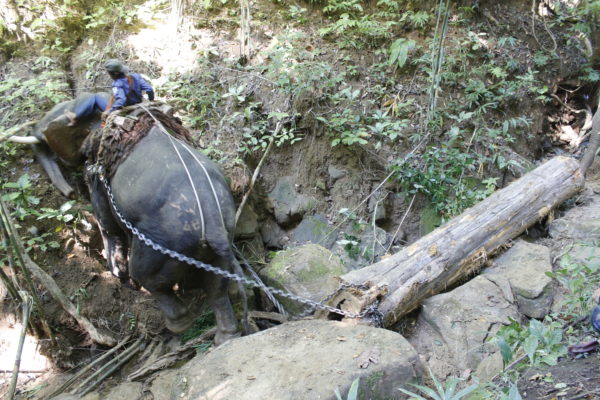MTLAS GAP Analysis
Myanmar Timber Legality Assurance System GAP Analysis
In early 2016, the Myanmar Forest Certification Committee (MFCC), supported by the Food and Agriculture Organization of the United Nations (FAO), commissioned a multi-stakeholder, participatory gap analysis of the Myanmar Timber Legality Assurance System (MTLAS). The gap analysis was a capacity building exercise with the main target beneficiaries being MFCC and the FLEGT-VPA Interim Task Force (ITF) members. The key points of the final report document the existing MTLAS and describes some of the gaps observed between MTLAS and existing international frameworks and best practice for standards and assurance systems. It proposes areas where MTLAS could be strengthened going forward.
The gap analysis was concluded in March 2017 and aims to inform the development of a VPA-TLAS through a multi-stakeholder process that would meet FLEGT requirements and incorporate elements of best practice for legality assurance systems. The report summarises the key findings, the methodology, MTLAS Principles and Criteria (C&I), Stakeholder Engagement in Standards Development, Governance and Assurance as well as MTLAS Operational Processes.
The project activities were based on a review of available documentation, inputs provided during an initial stakeholder workshop, observations made during field visits to selected sites, information provided by a Core Expert Group and other individuals as well as the feedback received from national and international stakeholders during a final national stakeholder consultation workshop.
MFCC held a two days’ Workshop on 3rdand 4thMarch, 2016 for project inception. The final report for the first day includes detailed information of the workshop discussions along with all the presentations. A second day report has also been produced. The Proceedings of the Final Workshop of Myanmar Timber Legality System (MTLAS) Gap Analysis Project, contain the key findings and consequent discussion points at the workshop, an international trade update, and other relevant information and presentation.
The final report acknowledges that at the time of the analysis “While the information reviewed is extensive it is possible that not all aspects of the existing system have been observed nor all gaps identified”. Indeed, one of the significant findings of the analysis was that there was no “mechanism for monitoring completeness and effectiveness of checks or making the results of the checks available to interested parties as would be required by international frameworks or best practice for assurance systems”.
Stakeholder engagement and public transparency are critical aspects of any Standard development progress and MFCC operational practices more generally. Since the project, MFCC made significant steps towards strengthening its system, and in particular with regards Standard Setting, and stakeholder engagement and public transparency.
One key finding of the project was that “the current MTLAS does not incorporate external third-party verification or assurance”. Likewise, since these recommendations were made MFCC has ran a series of training initiatives to develop the capacity of third party Certification Bodies. It should also be noted that a key aspect of MFCC policy is to now require Certification Bodies to make concrete and measureable steps towards achieving ISO accreditation including against ISO/IEC 17065: 2012: Conformity Assessment – Requirements for Bodies Certifying Product, Processes and Services.
A continuous log of the steps and activities MFCC has made to address the gaps identified through this project can be made available upon request. Please contact the MFCC Secretariat.
| GAP Analysis Related Documents | Date |
|---|---|
| Report of the Inception Workshop on MTLAS Gap Analysis Project | Mar 2016 |
| National Consultative Meeting on C&Is for Forest Management Certification | Mar 2016 |
| Proceedings of the Final Workshop of MTLAS Gap Analysis Project | Feb 2017 |
| Myanmar MTLAS Gap Analysis Project Final Report | Apr 2017 |



